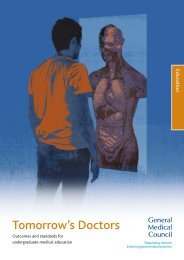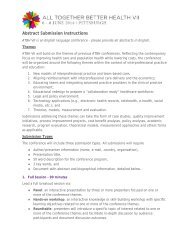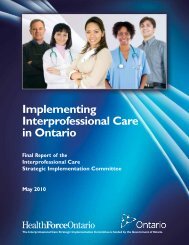Health and Social Care Policy and the Interprofessional ... - CAIPE
Health and Social Care Policy and the Interprofessional ... - CAIPE
Health and Social Care Policy and the Interprofessional ... - CAIPE
You also want an ePaper? Increase the reach of your titles
YUMPU automatically turns print PDFs into web optimized ePapers that Google loves.
to be a top priority. This means in many instances, reconfiguring health care<br />
services, embracing new technology <strong>and</strong> optimising <strong>the</strong> skills of <strong>the</strong><br />
workforce. Indeed some will argue that <strong>the</strong> hidden agenda is to address<br />
workforce shortages. Ways to achieve this have been identified including<br />
streng<strong>the</strong>ning <strong>the</strong> role of public health, diversifying funding <strong>and</strong> streng<strong>the</strong>ning<br />
<strong>the</strong> concept of governance.<br />
Thomas et al (2000), in a major study funded by <strong>the</strong> World Bank, concluded<br />
that ‘no country has ever achieved sustained development without substantial<br />
investment in <strong>the</strong> education <strong>and</strong> health of its people’ (p67) with <strong>the</strong>ir<br />
conclusions later supported in subsequent studies by Bloom et al (2001) <strong>and</strong><br />
<strong>the</strong> Commission on Macroeconomics <strong>and</strong> <strong>Health</strong> (2001) who found, in a study<br />
of more than 100 countries, that improvements in a nation’s health have a<br />
significant positive effect in improving economic performance <strong>and</strong> hence on<br />
Gross Domestic Product.<br />
There are very different approaches to healthcare delivery in <strong>the</strong> various EU<br />
countries, examples being patient autonomy, multi-professional teamwork <strong>and</strong><br />
confidentiality. Many of <strong>the</strong> differences are historically <strong>and</strong> culturally based<br />
<strong>and</strong> before <strong>the</strong> EU general system Directives that allowed free movement<br />
throughout Europe <strong>and</strong> mutual recognition of <strong>the</strong> majority of health<br />
professions this did not pose a problem (EU 1989 & EC 1992). In this<br />
millennium it does! Whilst responsibility for qualifications remains with <strong>the</strong><br />
Internal Market Directorate General many would support its move to <strong>the</strong><br />
<strong>Health</strong> <strong>and</strong> Consumer Protection Directorate General.<br />
McKee et al (2004: 101) perhaps hit <strong>the</strong> nail on <strong>the</strong> head when <strong>the</strong>y wrote:<br />
‘Nurses <strong>and</strong> o<strong>the</strong>r health professionals in <strong>the</strong> United Kingdom have developed<br />
<strong>the</strong>ir roles to an extent that might well be unthinkable in some o<strong>the</strong>r countries,<br />
taking on many tasks previously carried out by doctors. Multidisciplinary team<br />
working is essential in a hard-pressed NHS. In a relatively centralised system<br />
where most professionals are salaried or hold contracts involving capitation<br />
fees <strong>and</strong> <strong>the</strong> like, <strong>the</strong>se developments are less likely to be perceived as a<br />
threat than <strong>the</strong>y are in countries where doctors may perceive o<strong>the</strong>r health<br />
professionals as competing for fees’.<br />
They continue by saying however that ‘It would be impossible to st<strong>and</strong>ardise<br />
<strong>the</strong> roles of health professionals <strong>and</strong> senseless to try. Some degree of<br />
diversity is inevitable <strong>and</strong> indeed desirable. At <strong>the</strong> same time, increasing<br />
familiarity will also bring with it a degree of convergence as colleagues share<br />
experience <strong>and</strong> learn from each o<strong>the</strong>r’ (ibid:101).<br />
These two quotations bring into sharp focus <strong>the</strong> whole interprofessional<br />
debate. Many individuals in every country, including a significant minority<br />
within <strong>the</strong> UK, view <strong>the</strong> concept of working toge<strong>the</strong>r, collaborative practice,<br />
<strong>and</strong> all <strong>the</strong> o<strong>the</strong>r derivatives of <strong>the</strong>se, as a dilution of, <strong>and</strong> a direct threat to,<br />
<strong>the</strong>ir professional autonomy. While it is true that multidisciplinary team<br />
working when it works well helps <strong>the</strong> ‘hard pressed NHS’ (ibid) in part, it is<br />
certainly true that interprofessional/interagency collaboration helps deliver<br />
10













